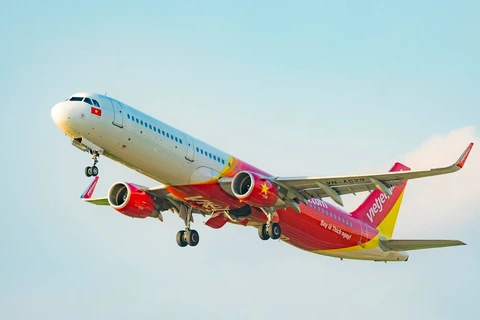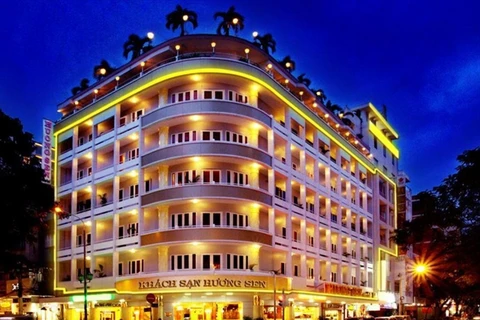Hanoi (VNS/VNA) - Increasing ceiling rates for airfares would bring more opportunities for local aviation firms to have flexible and suitable price policies in the domestic aviation market.
Domestic aviation firms made the statement after the Civil Aviation Authority of Vietnam (CAAV) proposed the Ministry of Transport temporarily halt the adjustment of ceiling rates for airfares, which was submitted to the ministry in March.
This change is likely to push domestic airfares up, according to the CAAV.
The authority said in the context of COVID-19 pandemic, stabilising prices to reduce socio-economic impacts is necessary. At present, passenger volume, seat occupancy and airlines' revenues have plummeted due to the pandemic.
Vietnam Airlines deputy general director Le Hong Ha said that according to this proposal on adjusting airfares in March, the ceiling rate of airfares for routes with a distance of less than 500km will be unchanged. While, the ceiling rates for routes with a distance from 500km will increase. Those are expected to not affect the consumer price index (CPI) this year.
In addition, Ha said the ceiling price mechanism needs to be abolished to help local aviation firms gain revenue in the short-term.
“This will help Vietnam Airlines and other local aviation firms have flexible airfare policies and improve quality of services for customers,” Ha told the Voice of Vietnam (VOV).
“That will also help them have more cheap rates."
An expert in the aviation industry said increasing the ceiling rates for airfares does not mean higher airfares. The increase of ceiling rates would create good conditions for the airlines to improve quality of services for passengers, especially those willing to pay high prices.
At the same time, the aviation companies will have chances to build more rates of air ticket prices and more stimulus programmes with suitable airfares, the expert said.
Aviation expert Nguyen Thieu Tong said now the State should not permit aviation companies to set their own airfares.
Vietnam has a small number of aviation companies while domestic demand is increasing. Therefore, if the local aviation market does not have a ceiling price mechanism, those local firms could work together to increase air ticket prices. It will create disadvantages for passengers, Tong said.
When the domestic aviation market has a healthy and transparent competitive environment, the State could remove this ceiling price mechanism for air tickets, he said.
CAAV director Dinh Viet Thang said now this market still needs the State to manage air ticket prices. The State management could be removed when the aviation market has a healthy competitive environment and the State would only intervene in the local aviation market when this market faces a crisis.
The Ministry of Transport has requested the CAAV to review those issues and report to the ministry before May 31.
According to Vietnam Airlines, the transport cost per passenger was 1,933 VND per km in 2015. The cost rose to 2,027 VND per km in 2018 and 2,345 VND per km in the first three months of this year. It is expected to increase to 12,925 VND per km by year-end.
Fluctuations in input costs of the aviation industry from 2019 have made the CAAV propose the increase of ceiling rates for airfares in March. Specifically, in February, the jet fuel A1 price in Asia was 65.27 USD per barrel, up by 11.36 percent compared to August 2015. Environment protection tax increased by 200 percent compared to that in August 2015.
According to the proposal, the ceiling price for routes for socio-economic development and other routes less than 500km are unchanged at 1.6 million VND and 1.7 million VND per one way ticket, respectively.
Maximum ticket price for the routes of 500km to under 850km increases by 2.27 percent from 2.2 million VND to 2.25 million VND per one way ticket.
Meanwhile, the routes of 850km to under 1,000km have maximum ticket price of 2.89 million VND per one way ticket, an increase of 3.58 percent from 2.79 million VND.
Routes with a distance of 1,000km to under 1,280km have a maximum fare of 3.4 million VND per one way ticket, a surge of 6.25 percent from 3.2 million VND.
For flights with a distance of 1,280km upward, the maximum ticket price is 4 million VND, 6.67 percent higher than the current rate of 3.75 million VND per one way ticket./.
Domestic aviation firms made the statement after the Civil Aviation Authority of Vietnam (CAAV) proposed the Ministry of Transport temporarily halt the adjustment of ceiling rates for airfares, which was submitted to the ministry in March.
This change is likely to push domestic airfares up, according to the CAAV.
The authority said in the context of COVID-19 pandemic, stabilising prices to reduce socio-economic impacts is necessary. At present, passenger volume, seat occupancy and airlines' revenues have plummeted due to the pandemic.
Vietnam Airlines deputy general director Le Hong Ha said that according to this proposal on adjusting airfares in March, the ceiling rate of airfares for routes with a distance of less than 500km will be unchanged. While, the ceiling rates for routes with a distance from 500km will increase. Those are expected to not affect the consumer price index (CPI) this year.
In addition, Ha said the ceiling price mechanism needs to be abolished to help local aviation firms gain revenue in the short-term.
“This will help Vietnam Airlines and other local aviation firms have flexible airfare policies and improve quality of services for customers,” Ha told the Voice of Vietnam (VOV).
“That will also help them have more cheap rates."
An expert in the aviation industry said increasing the ceiling rates for airfares does not mean higher airfares. The increase of ceiling rates would create good conditions for the airlines to improve quality of services for passengers, especially those willing to pay high prices.
At the same time, the aviation companies will have chances to build more rates of air ticket prices and more stimulus programmes with suitable airfares, the expert said.
Aviation expert Nguyen Thieu Tong said now the State should not permit aviation companies to set their own airfares.
Vietnam has a small number of aviation companies while domestic demand is increasing. Therefore, if the local aviation market does not have a ceiling price mechanism, those local firms could work together to increase air ticket prices. It will create disadvantages for passengers, Tong said.
When the domestic aviation market has a healthy and transparent competitive environment, the State could remove this ceiling price mechanism for air tickets, he said.
CAAV director Dinh Viet Thang said now this market still needs the State to manage air ticket prices. The State management could be removed when the aviation market has a healthy competitive environment and the State would only intervene in the local aviation market when this market faces a crisis.
The Ministry of Transport has requested the CAAV to review those issues and report to the ministry before May 31.
According to Vietnam Airlines, the transport cost per passenger was 1,933 VND per km in 2015. The cost rose to 2,027 VND per km in 2018 and 2,345 VND per km in the first three months of this year. It is expected to increase to 12,925 VND per km by year-end.
Fluctuations in input costs of the aviation industry from 2019 have made the CAAV propose the increase of ceiling rates for airfares in March. Specifically, in February, the jet fuel A1 price in Asia was 65.27 USD per barrel, up by 11.36 percent compared to August 2015. Environment protection tax increased by 200 percent compared to that in August 2015.
According to the proposal, the ceiling price for routes for socio-economic development and other routes less than 500km are unchanged at 1.6 million VND and 1.7 million VND per one way ticket, respectively.
Maximum ticket price for the routes of 500km to under 850km increases by 2.27 percent from 2.2 million VND to 2.25 million VND per one way ticket.
Meanwhile, the routes of 850km to under 1,000km have maximum ticket price of 2.89 million VND per one way ticket, an increase of 3.58 percent from 2.79 million VND.
Routes with a distance of 1,000km to under 1,280km have a maximum fare of 3.4 million VND per one way ticket, a surge of 6.25 percent from 3.2 million VND.
For flights with a distance of 1,280km upward, the maximum ticket price is 4 million VND, 6.67 percent higher than the current rate of 3.75 million VND per one way ticket./.
VNA

























